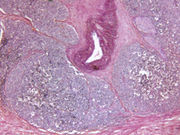Immunomodulatory in situ gene tx/IMRT with or without hormonal tx deemed feasible, safe
TUESDAY, Dec. 15, 2015 (HealthDay News) — A combination of immune-modulatory in situ gene therapy (GT) and intensity-modulated radiotherapy (IMRT) is highly effective in treating prostate cancer, according to a study published online Dec. 12 in the Journal of Radiation Oncology.
The GT was comprised of intraprostatic injection of adenoviral vector containing herpes simplex thymidine kinase followed by valacyclovir. The study included just over 60 patients who were divided into two groups. One group, who had cancer cells confined to the prostate, received radiation treatment. The second group, who had more aggressive prostate cancer, received both radiation and hormone treatments. The first group received the experimental gene therapy twice, and the second group received it three times during a phase II clinical trial conducted between 1999 and 2003.
Two years after treatment, prostate biopsies were negative in 83 percent of the first group and 79 percent of the second group. After five years, there was no sign of cancer recurrence in 94 percent of the first group and 91 percent of the second group. Five-year survival rates were 97 and 94 percent, respectively.
“The combination of immunomodulatory in situ gene therapy and IMRT with or without hormonal therapy is feasible, safe, and effective in the treatment of prostate cancer,” the authors conclude. “This approach with long term follow up appears to provide better clinical outcome over historical controls. A randomized trial of this strategy is currently ongoing.”
Full Text (subscription or payment may be required)
Copyright © 2015 HealthDay. All rights reserved.








